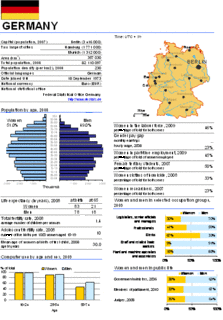The IMF International Financial Statistics (IFS) is a compilation of financial data collected from various sources, covering over 200 countries worldwide, which is published monthly by the International Monetary Fund (IMF).
ESDS International was a Jisc/ESRC funded service which provided the UK academic community with free online access to the major databanks produced by international governmental organisations such as the World Bank, International Monetary Fund and the United Nations. The service also supported the use of these databanks in teaching and research through the provision of a helpdesk for user queries, comprehensive documentation and training.
The English Longitudinal Study of Ageing (ELSA) is a longitudinal study that collects multidisciplinary data from a representative sample of the English population aged 50 and older. The study started in 2002 and there are currently 7 waves of completed data and an eighth wave is currently being collected. The survey data are designed to be used for the investigation of a broad set of topics relevant to understanding the ageing process. Both objective and subjective data are collected covering themes such as health trajectories, disability and healthy life expectancy, the determinants of economic position in older age; the links between economic position, physical health, cognition and mental health; the nature and timing of retirement and post-retirement, labour market activity; household and family structure, social networks and social supports; patterns, determinants and consequences of social, civic and cultural participation and predictors of well-being. ELSA is led by Professor Andrew Steptoe and is jointly run by teams at University College London (UCL), the Institute for Fiscal Studies (IFS), National Centre for Social Research and the University of Manchester.
Secondary data refers to data which is collected by someone who is someone other than the user. Common sources of secondary data for social science include censuses, information collected by government departments, organizational records and data that was originally collected for other research purposes. Primary data, by contrast, are collected by the investigator conducting the research.

Official statistics are statistics published by government agencies or other public bodies such as international organizations as a public good. They provide quantitative or qualitative information on all major areas of citizens' lives, such as economic and social development, living conditions, health, education, and the environment.
The Evidence for Policy and Practice Information and Co-ordinating Centre (EPPI-Centre) is part of the Social Science Research Unit at the Institute of Education, University of London. Its work is concerned with systematic reviews which use transparent and explicit methodologies for reviewing research evidence in order to be clear about what we know from research and how we know it.

A census of the population of the United Kingdom is taken every ten years. The 2011 census was held in all countries of the UK on 27 March 2011. It was the first UK census which could be completed online via the Internet. The Office for National Statistics (ONS) is responsible for the census in England and Wales, the General Register Office for Scotland (GROS) is responsible for the census in Scotland, and the Northern Ireland Statistics and Research Agency (NISRA) is responsible for the census in Northern Ireland.
ESDS Qualidata is a specialist service of the Economic and Social Data Service (ESDS), led by the UK Data Archive at the University of Essex, jointly funded by the Joint Information Systems Committee (JISC) and the Economic and Social Research Council (ESRC). The service provides access to a wide range of qualitative data from the social sciences as well as user-support, promoting the increased use of secondary analysis in social research and related learning and teaching resources.
The Economic and Social Data Service (ESDS) is a national data archiving and dissemination service that was founded in January 2003. It is funded jointly by the Economic and Social Research Council (ESRC) and Jisc. In July 2012, the ESRC announced it will become a partner in the UK Data Service, to be established as of October 1, 2012.
ESDS Longitudinal is a specialist service of the Economic and Social Data Service (ESDS), led by the UK Data Archive at the University of Essex and the ESRC United Kingdom Longitudinal Studies Centre (ULSC), jointly funded by the Joint Information Systems Committee (JISC) and the Economic and Social Research Council (ESRC).
The Annual Population Survey (APS) is a combined statistical survey of households in Great Britain which is conducted quarterly by the Office for National Statistics (ONS). It combines results from the Labour Force Survey (LFS) and the English, Welsh and Scottish Labour Force Survey boosts which are funded by the Department for Education and Skills (DfES), the Department for Work and Pensions (DWP), the National Assembly for Wales and the Scottish Executive.
The Millennium Cohort Study (MCS) is a longitudinal survey conducted by the Centre for Longitudinal Studies (CLS) at the University of London, following the lives of a sample of about 18,818 babies born in the UK in the year 2000–2001.
The 1970 British Cohort Study (BCS70) is a continuing, multi-disciplinary longitudinal survey monitoring the development of babies born in the UK during the week of 5–11 April 1970.
The Families and Children Study (FACS) is a longitudinal study collecting information about families with dependent children in Great Britain, managed by the Department for Work and Pensions (DWP).
The World Bank Africa Development Indicators (ADI) is a compilation of data, assembled by the World Bank, representing over 1,400 indicators of development in Sub-Saharan Africa.

The UK Data Service is a national data service that provides research access to a range of social and economic data collections including UK census data and government funded surveys as well as qualitative and business data.




